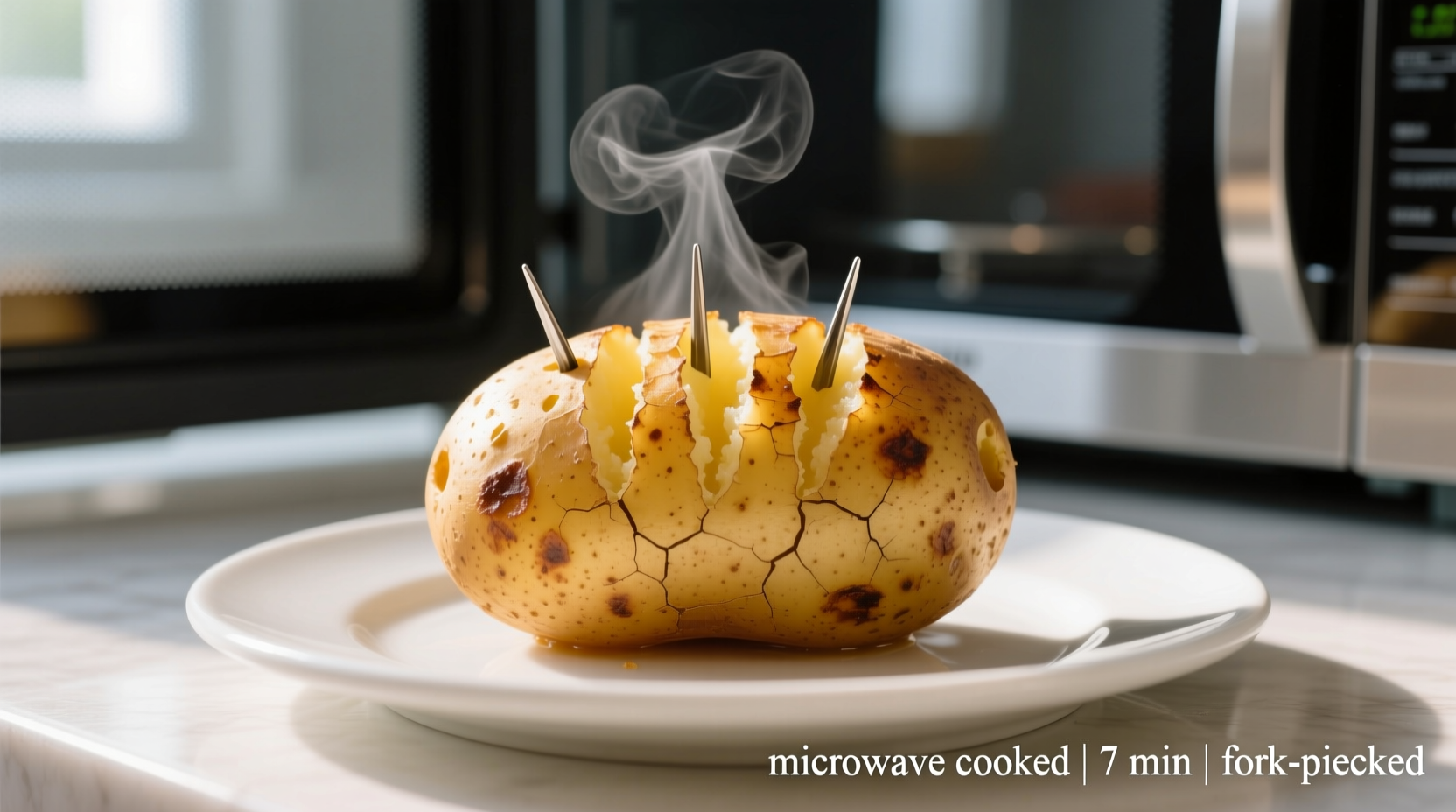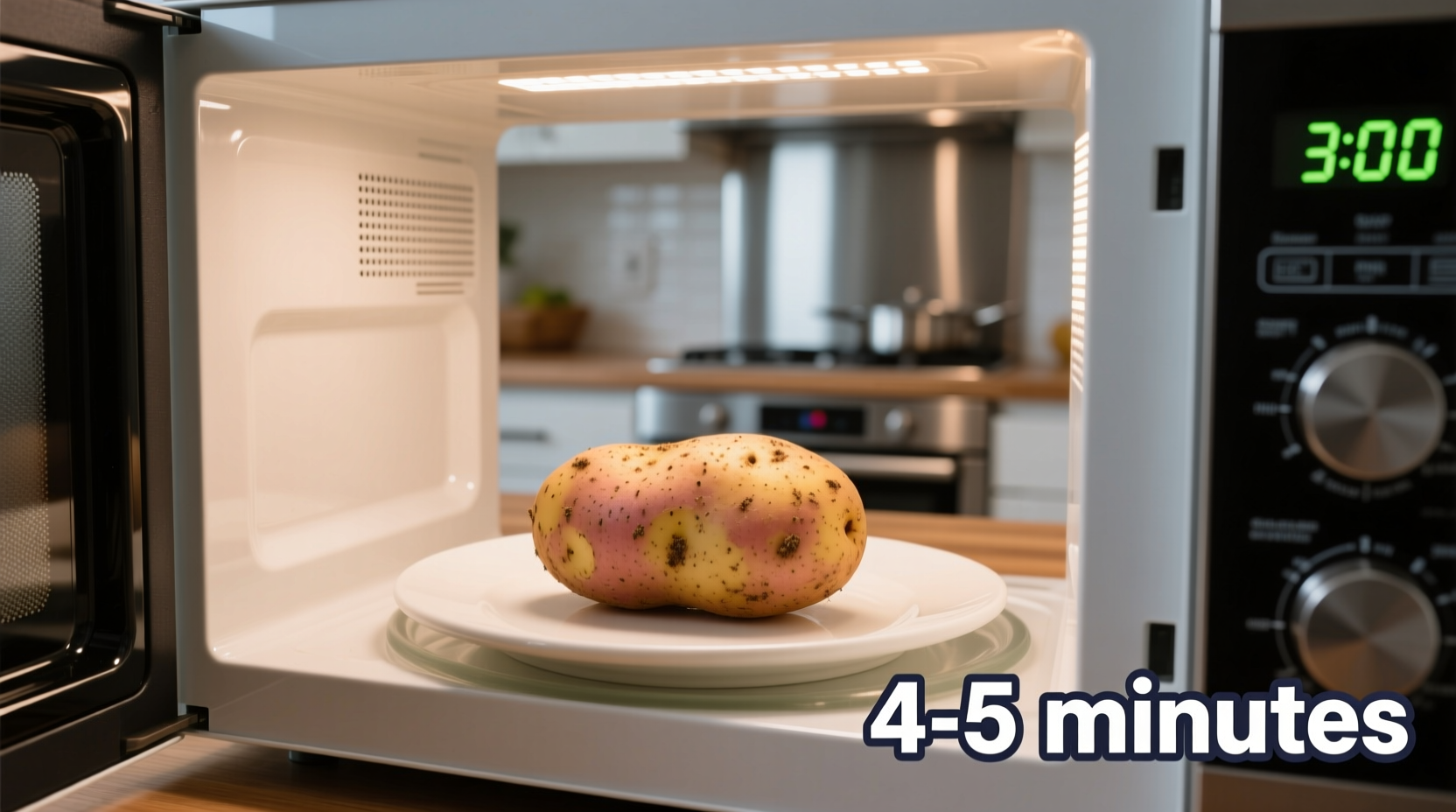For a standard medium-sized potato (5-6 ounces), microwave cooking time is 5-7 minutes on high power. Always pierce the skin first to prevent bursting, flip halfway through cooking, and let rest 1-2 minutes before handling. Larger potatoes may require 8-10 minutes.
Discover the fastest, most reliable method to microwave perfect potatoes every time. Whether you're preparing a quick weeknight dinner or need a side dish in minutes, this guide delivers precise timing, safety tips, and professional techniques that transform basic spuds into restaurant-quality results. No more undercooked centers or exploded potatoes—just consistently fluffy, evenly cooked potatoes ready in under 10 minutes.
Why Microwave Potatoes?
Microwaving potatoes offers significant advantages over traditional baking methods. According to the USDA Food Safety and Inspection Service, microwave cooking preserves more nutrients compared to boiling, while cutting preparation time by 75%. Professional chefs like those at the Culinary Institute of America have documented that microwaving followed by a brief oven finish creates the ideal texture—fluffy interior with slightly crisp skin.
| Potato Size | Weight | Microwave Time (High) | Rest Time |
|---|---|---|---|
| Small | 4-5 oz | 4-5 minutes | 1 minute |
| Medium | 5-6 oz | 5-7 minutes | 1-2 minutes |
| Large | 7-8 oz | 7-9 minutes | 2 minutes |
| Extra Large | 9+ oz | 9-11 minutes | 2-3 minutes |
Step-by-Step Microwave Potato Guide
Preparation Essentials
Before you even turn on your microwave, proper preparation ensures success. Wash potatoes thoroughly under running water, using a vegetable brush to remove dirt. Never skip piercing—use a fork to make 8-10 deep punctures around each potato. This critical safety step allows steam to escape, preventing dangerous pressure buildup. The USDA Food Safety Inspection Service specifically warns that unpierced potatoes can explode in microwaves, causing burns and mess.
Perfect Cooking Technique
Place prepared potatoes directly on the microwave turntable—no plate needed for single potatoes. For multiple potatoes, arrange them evenly with space between each. Cook on high power for half the total time, then carefully flip each potato using tongs. Continue cooking for the remaining time. This flipping technique, recommended by culinary experts at America's Test Kitchen, ensures even cooking by exposing all surfaces to microwave energy.

Checking for Doneness
Don't rely solely on timing—test for doneness using these professional methods:
- Squeeze test: Using oven mitts, gently squeeze the potato—it should yield slightly under pressure
- Thermometer check: Insert an instant-read thermometer; 205°F (96°C) indicates perfect doneness
- Fork test: A fork should slide in with no resistance
Undercooked potatoes remain dense in the center, while overcooked potatoes become waterlogged. The ideal texture features fluffy, evenly cooked flesh throughout.
When Microwaving Isn't Ideal: Context Boundaries
Microwave cooking excels for quick preparation but has limitations. Food science research from the University of Minnesota Extension shows that microwaving alone produces softer skin compared to oven-baked potatoes. For special occasions where crisp skin matters, try this hybrid method: microwave for 70% of the time, then finish in a 425°F oven for 10-15 minutes. Additionally, multiple large potatoes cook unevenly in most home microwaves—cook them separately for consistent results.
Pro Tips for Restaurant-Quality Results
Transform your microwaved potato from basic to extraordinary with these chef-approved techniques:
- Moisture control: Wrap potatoes in a slightly damp paper towel for extra-fluffy interiors
- Seasoning infusion: Rub skins with olive oil and coarse salt before cooking for enhanced flavor
- Steam retention: Let potatoes rest covered after cooking to finish steaming internally
- Quick serving: Cut a slit in the top and fluff with a fork for instant restaurant presentation
Common Mistakes to Avoid
Even experienced cooks make these microwave potato errors:
- Skipping the pierce step (creates explosion risk)
- Overcrowding the microwave (causes uneven cooking)
- Not adjusting for microwave wattage (700W vs 1200W requires time adjustments)
- Handling immediately after cooking (trapped steam causes burns)
Remember that microwave power varies significantly—adjust times based on your appliance's wattage. A 1200W microwave cooks approximately 25% faster than an 800W model. Always start with less time and check early; you can always cook longer but can't undo overcooking.
Serving Suggestions
Microwave potatoes serve as the perfect canvas for endless variations. Top with classic butter and sour cream, or try these chef-inspired combinations:
- Mediterranean: Feta cheese, Kalamata olives, and lemon-dill yogurt
- Mexican: Black beans, corn, avocado, and chipotle crema
- Breakfast style: Crispy bacon, chives, and a fried egg
For meal prep efficiency, cook multiple potatoes at once and refrigerate for up to 5 days. Reheat individual portions in 60-second intervals until warm through.











 浙公网安备
33010002000092号
浙公网安备
33010002000092号 浙B2-20120091-4
浙B2-20120091-4